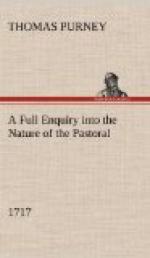Ancient Terms were doubtless a great disadvantage, especially to Spencer, when his Works appear’d first in the World; but he had a Soul large enough to write rather for Posterity, than present Applause. He took so excessive a delight in the Old Language of his admired Chaucer, that he could not help, in some measure, imitating it.
Our greatest Writers having all given into an Ancient Dialect, would almost encline us of the present Age, to think of making their Language a standing Language; for Queen Elizabeth’s Age is to us what Augustus’s was to the Latins; we must never hope to have so many noble Genius’s adorn any one Age for the future; I might have said, any twenty Ages. Therefore if any English Dialect survives to the World’s End, ’twill certainly be theirs; and ’twill be prudence in any After-writer to draw his Language as near to theirs as possible; that if theirs are understood a thousand Years hence, his may too.
But to leave the Consideration of Old-Words in Epick Poetry and Tragedy, let us proceed to Pastoral. There are several Advantages flow from the Use of Old-Words, but I have time to mention but two or three.
There is a Spirit and a Liveliness of Expression to be preserv’d in Pastoral as well as other Poetry; now I affirm that ’tis impossible to perform this without Old-Words; unless a Writer make Shepherds talk Sublimely, and with Passion, as in Tragedies.
Again, if a Writer has a Genius for Pastoral he will have some Thoughts occur so inimitably Simple, that they would appear ridiculous in the Common Language; and ’tis necessary that the Language should answer to the Thought. These are the finest Thoughts of all for pastoral.
There are also several Thoughts which, tho’ extreamly agreeable to the simple Innocence of young Country Girls, will appear too luscious, unless the Simplicity and Rusticity of the Speaker appear’s, by the Old Language spoken. But we smile at a Thought in such simple Language, which perhaps we shall nauseate in a polite Dialect.
But one of the greatest Advantages of Old-Words, is, that they afford the Writer so fine an Opportunity of rendring his Language most inimitably soft and smooth. This cannot be done by any other Means; and how proper soft and simple Language is to Pastoral (at least where the Characters are Young, Tender, and Innocent) I need not say. As for VIRGIL and those Pastoral Writers who seem not to aim at Simplicity in either their Characters or Sentiments, the using of Old-Words is entirely different with regard to them. To see a Sentiment, which would as well become any other Person as a Shepherd, dress’d in the Simplicity of an Ancient Dialect, would appear nothing but Affectation. We are used to see such Sentiments in another Dress. Nay, were their Thoughts Simple, ’twould not be agreeable for them to use Old-Words, unless the whole Turn of their Language was answerable to it; to have a common, ordinary Language, with Old-Words scatter’d through it, is a mixt confused Language, and what is very expressively named by our Word Hodge-podge. ’Tis not enough therefore, for the forming a pastoral Language to use Old-Words; a Writer must set down, and by true Pains and Industry constitute a Language entirely of a piece and consistant; in performing which the choicest Old-Words will be of some little Assistance.




